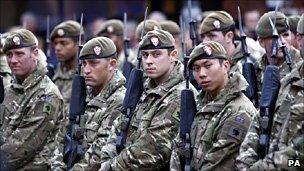Military pensions 'not protected', Downing St says
- Published

Critics say military pensions should be made a special case
Downing Street has rejected calls to protect the armed forces from cuts to public sector pensions.
A spokesman for Prime Minister David Cameron said "tough decisions" were needed and the policy decision had been made.
The Forces Pension Society claims widows and injured soldiers face losing hundreds of thousands of pounds.
Ministers plan to link public sector pension rises to an alternative, and historically lower, inflation measure.
Chancellor George Osborne announced in the June Budget that public sector pensions would, from April 2011, be linked to the consumer prices index (CPI) - rather than the retail prices index (RPI) - as part of a package aimed at saving £11bn, part of the government's efforts to reduce the record budget deficit.
The Forces Pensions Society calculates that the inflation link - which affects pensions and annual guaranteed income payments - means a 34-year-old wife of a staff sergeant killed in Afghanistan could lose almost £750,000 over her lifetime.
Writing in the Times, the society's head, Vice Admiral Sir Michael Moore, said: "It is so easy for Mr Cameron to extol the forces at every opportunity... but his words will have a hollow ring unless he addresses these issues personally.
"His ministers do not understand, show no inclination of wanting to do so and appear to be rendered impotent and mesmerised by the Treasury."
He also said widows who remarry or move in with a new partner would lose their military pensions.
Major General Patrick Cordingley, commander of the Desert Rats in the Gulf War, said: "It is arguable that a special case should be made for the armed forces and their dependants because they are likely to be widowed at a much younger age and there is considerably more risk for servicemen than for other government employees."
'Too expensive'
And former Labour defence secretary Lord Hutton - the man the government appointed to oversee a review of public sector pensions - said linking the military pension to the consumer price index, rather than the retail price index, would mean war widows and the injured would get smaller payments in future.
But a Ministry of Defence spokesman said: "It is not possible to treat the armed forces differently from other public servants. Attempting to retrospectively change previous pension schemes could not be done - it would be too expensive, especially given the current financial situation."
He said that widows covered by the most recent armed forces pensions scheme, opened in 2005, did not lose pensions if they remarried.
A Downing Street spokeswoman added: "The prime minister has the highest regard for the armed forces and their families but tough decisions had to be made in this particular respect."
And Defence Minister Andrew Robathan - who was criticised in Vice Admiral Sir Michael's letter, said it had not been possible to exempt military pensions because of the "economic wreckage left behind by Labour".
- Published12 November 2010
- Published23 June 2010
- Published10 August 2010